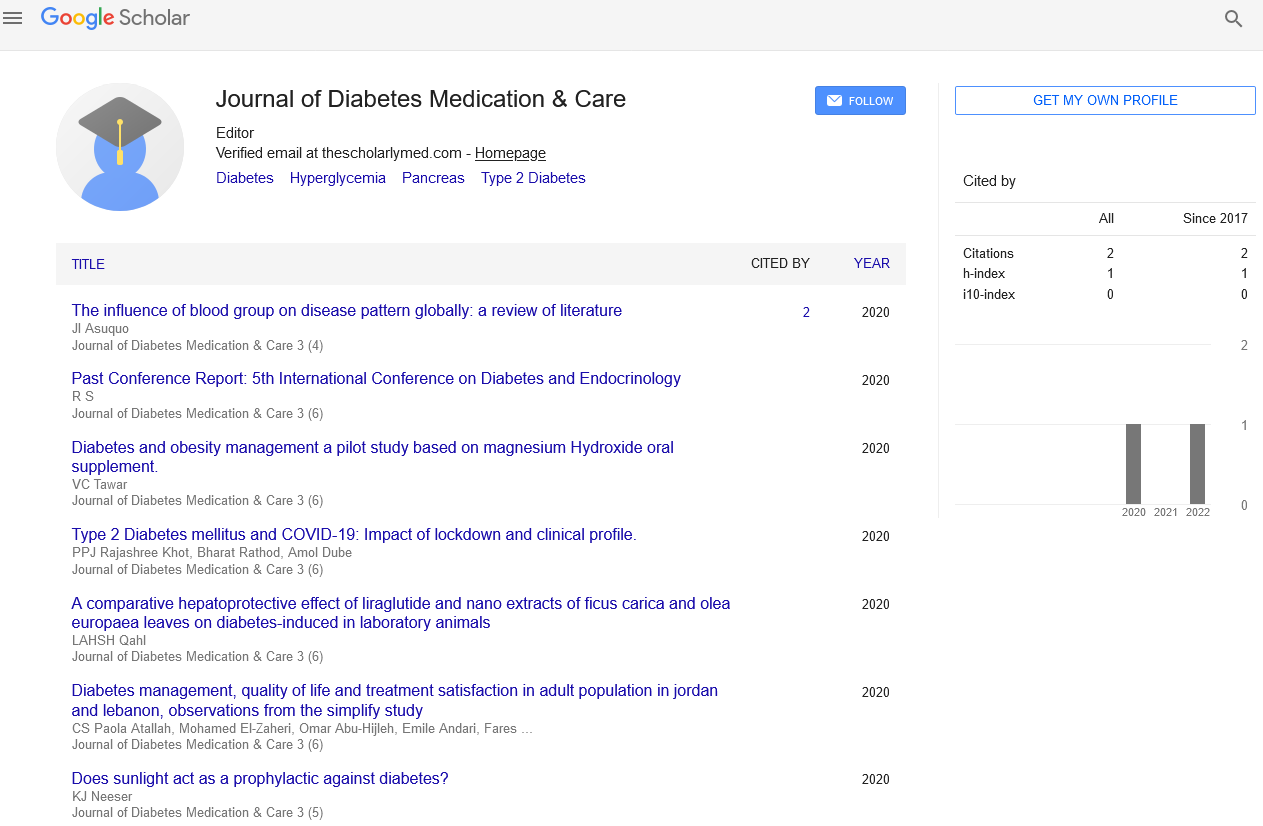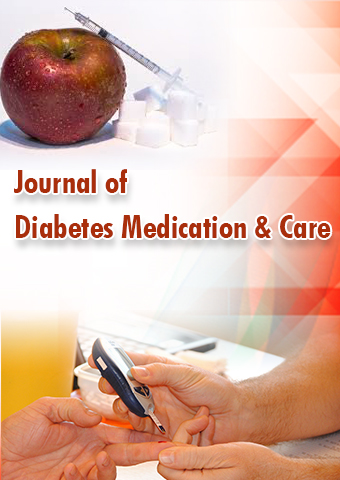Opinion Article - Journal of Diabetes Medication & Care (2024) Volume 7, Issue 1
Exploring the Intricate Dance: Unravelling the Correlation Between Diabetes and Thyroid Functioning
- Corresponding Author:
- Vishal Gupta
Department of Endocrinology, University of Zagreb, Zagreb, Croatia
E-mail: vishaadra@yahoo.co.in
Received: 02-Jan-2024, Manuscript No. JDMC-24-124928; Editor assigned: 05-Jan-2024, PreQC No. JDMC-24-124928 (PQ); Reviewed: 19-Jan-2024, QC No. JDMC-24-124928; Revised: 26-Jan-2024, Manuscript No. JDMC-24-124928 (R); Published: 05-Feb-2024, DOI: 10.37532/JDMC.2024.7(1).164-165
Introduction
In the intricate web of human physiology, the correlation between diabetes and thyroid functioning stands out as a complex and fascinating interplay. Both diabetes mellitus and thyroid disorders are prevalent endocrine conditions that significantly impact the overall health and well-being of individuals. This article delves into the intricate relationship between diabetes and thyroid function, shedding light on the physiological connections, shared risk factors, and the clinical implications of managing these conditions in tandem.
Description
Understanding diabetes mellitus
Diabetes mellitus, commonly known as diabetes, is a chronic metabolic disorder characterized by elevated blood glucose levels. The condition arises due to the body’s inability to produce sufficient insulin or effectively utilize the insulin it produces. Insulin, a hormone produced by the pancreas, plays a crucial role in regulating blood sugar levels by facilitating the uptake of glucose into cells.
There are two main types of diabetes: Type 1 and type 2. Type 1 diabetes results from the immune system mistakenly attacking and destroying insulin-producing beta cells in the pancreas. On the other hand, type 2 diabetes is characterized by insulin resistance, where the body’s cells do not respond effectively to insulin, and the pancreas cannot produce enough insulin to compensate.
Thyroid functioning: A brief overview
The thyroid gland, a butterfly-shaped organ located in the neck, is a vital component of the endocrine system. It produces hormones-thyroxine (T4) and triiodothyronine (T3)-that regulate various metabolic processes, including energy production and utilization. The release of these hormones is controlled by the Thyroid-Stimulating Hormone (TSH) produced by the pituitary gland.
Thyroid disorders encompass a spectrum of conditions, with the two main categories being hypothyroidism and hyperthyroidism. In hypothyroidism, the thyroid gland fails to produce sufficient thyroid hormones, leading to a slowdown in metabolism. Conversely, hyperthyroidism is characterized by an overactive thyroid, resulting in an accelerated metabolic rate.
Connecting the dots: Diabetes and thyroid dysfunction
While diabetes and thyroid disorders are distinct entities, there exists a notable correlation between the two. Understanding the links requires a closer examination of the intricate mechanisms governing both systems.
Shared risk factors
Several risk factors contribute to the development of both diabetes and thyroid disorders, creating an overlapping web of susceptibility. Genetic predisposition, autoimmune conditions, and age are common risk factors that increase the likelihood of individuals developing either diabetes or thyroid dysfunction. The interplay of these risk factors suggests a shared genetic and environmental foundation for these endocrine conditions.
Autoimmune connections
Type 1 diabetes and certain thyroid disorders, such as Hashimoto’s thyroiditis and Graves’ disease, share an autoimmune origin. In autoimmune diseases, the body’s immune system mistakenly targets and attacks its own tissues. In the case of type 1 diabetes, the immune system attacks insulin-producing beta cells, while in thyroid disorders, it targets the thyroid gland. The co-occurrence of these autoimmune conditions underscores the intricate connection between the immune system, diabetes, and thyroid dysfunction.
Impact on metabolism
Both diabetes and thyroid disorders exert profound effects on metabolism. In diabetes, the inability to regulate blood glucose disrupts normal metabolic processes. Similarly, thyroid hormones play a pivotal role in setting the metabolic rate. The imbalance caused by hypo-or hyperthyroidism can influence insulin sensitivity and glucose metabolism, contributing to the development or exacerbation of diabetes.
Clinical implications and challenges
Managing diabetes and thyroid dysfunction simultaneously poses unique challenges for healthcare professionals. The dynamic interaction between these conditions necessitates a comprehensive and integrated approach to patient care.
Screening and diagnosis
Given the interdependence of diabetes and thyroid disorders, healthcare providers must consider the coexistence of these conditions when evaluating patients. Routine screenings for thyroid function, especially in individuals with diabetes or a family history of thyroid disorders, can aid in early detection and proactive management.
Treatment considerations
The treatment of one condition can impact the management of the other. For example, certain medications used in diabetes management, such as glucocorticoids, may influence thyroid function. Healthcare professionals must carefully tailor treatment plans to address both diabetes and thyroid dysfunction without exacerbating either condition.
Lifestyle modifications
Shared risk factors, such as obesity and sedentary lifestyles, contribute to the development of both diabetes and thyroid disorders. Encouraging lifestyle modifications, including regular exercise and a balanced diet, can positively impact both conditions. Moreover, weight management becomes a crucial aspect of the holistic approach to diabetes and thyroid dysfunction.
Conclusion
The intricate correlation between diabetes and thyroid functioning unveils a captivating interplay within the realm of endocrine disorders. From shared risk factors to autoimmune connections and impacts on metabolism, the links between these conditions underscore the need for a comprehensive understanding and management strategy.
Healthcare professionals, armed with knowledge about these intricate relationships, can navigate the complexities of diagnosing and treating individuals with diabetes and thyroid dysfunction. As research continues to unravel the nuances of this correlation, the integration of findings into clinical practice promises to enhance the quality of care for those navigating the delicate dance between diabetes and thyroid function. Embracing a holistic approach that addresses both conditions concurrently is key to promoting optimal health and well-being in individuals facing these interconnected endocrine challenges.

